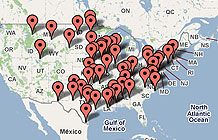
MSA: Austin-Round Rock, TX
Best places ranking: #8 among large metro areas Population: 1,652,602
Entrepreneurial ventures and small businesses have thrived in Austin, which has a number of angel investment groups that focus on startup businesses. The state capital, like the rest of Texas, is known for its business-friendly tax structure -- no state personal income tax, no corporate income tax -- and support for business development, particularly in the technology sector.
The Austin metro area, which has doubled its population growth in the last 20 years, is often used as a test market by national companies because its large minority population reflects the nation's future demographic mix. With University of Texas college students in residence, the area offers entrepreneurial opportunities for the youth market and skilled workers for local businesses. One-third of the area's payroll is related to technology jobs, contributing to Austin's reputation for having one of the most educated workforces in the nation. Challenges cited by business owners center around transportation issues. The number of flights and routes serviced by airlines can be problematic compared with larger markets. Mass transit is not plentiful. While the summers can be scorchers, residents enjoy outdoor activities year-round. Austin is home to a vibrant music, film, theater and arts community, and is known for its annual SXSW and Austin City Limits music festivals. -Dinah Eng |
||||||||||||||||||||||||||||||||||||||||||||||||||||||||||||||
Launch Toolbox:
Resources for getting started in Austin, TX

LEARNLocal startup resources
| ||||||||||||||||||||||||||||||||||||||||||||||||||||||||||||||
|
Austin Business Statistics
|
||||||||||||||||||||||||||||||||||||||||||||||||||||||||||||||
What do you think of Austin?




